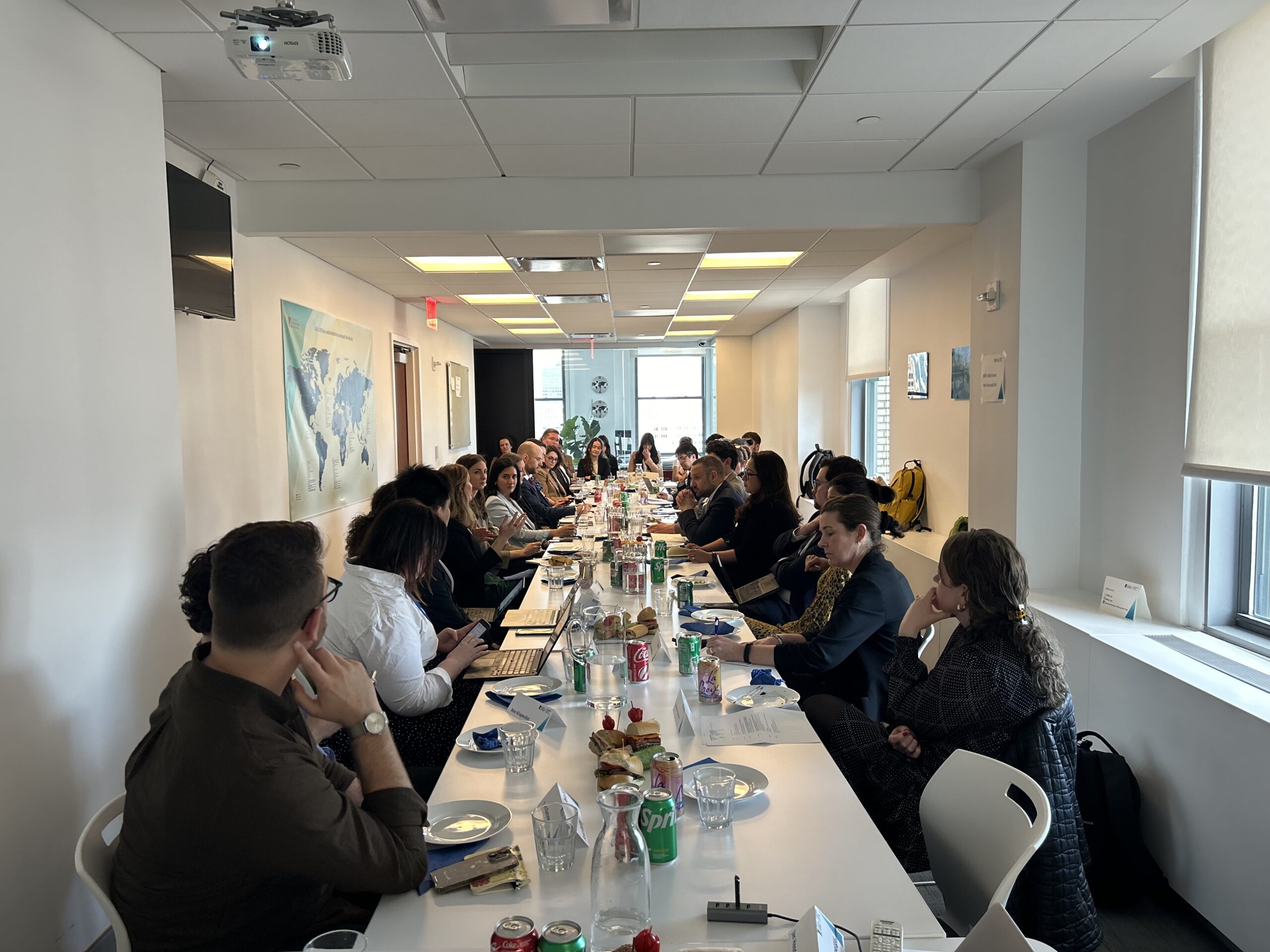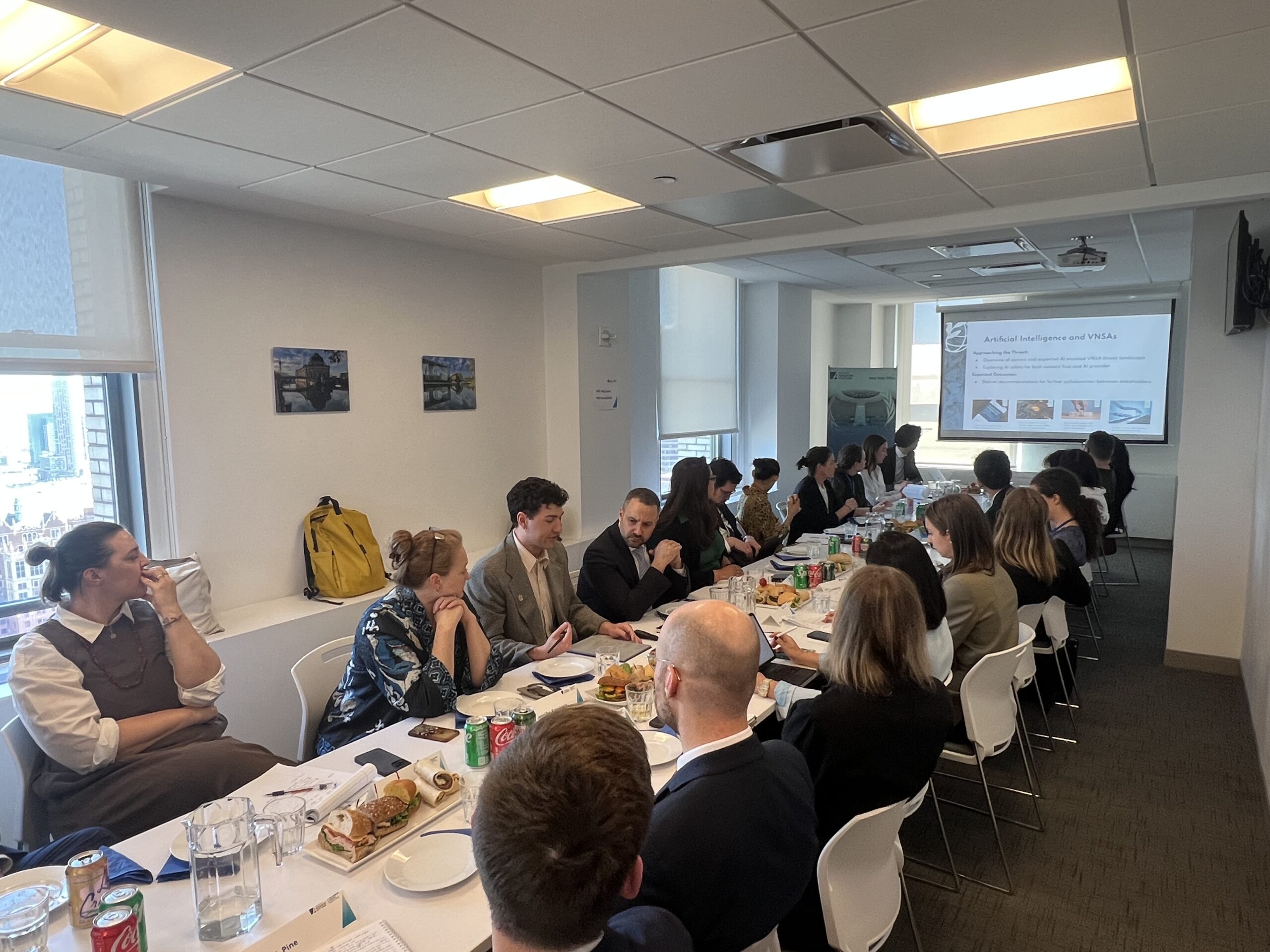The Global Internet Forum to Counter Terrorism (GIFCT) and the Konrad Adenauer Foundation (KAS) were pleased to collaborate on a report, Artificial Intelligence: Threats, Opportunities, and Policy Frameworks for Countering VNSAs, co-authored by GIFCT Senior Director of Membership & Programs Dr. Erin Saltman and GIFCT Director of Trust & Safety Solutions Skip Gilmour. The report was launched at an event in New York at the offices of KAS on April 29th that was also cohosted by the UN Office of Counter-Terrorism (UN OCT) and brought together representatives from government, industry, civil society, and several United Nations (UN) bodies.

Photo: KAS
The report offers a brief introduction to how violent non-state actors (VNSAs), including terrorist groups, are and could exploit artificial intelligence (AI) for a number of uses, including propaganda, operationalizing attacks, and sourcing material. It examines the intersections of practice and policy, as well as the range of solutions that industry, practitioners, and policymakers might consider to mitigate the risks.
In his opening remarks, KAS Executive Director Thomas Tödtling stressed the importance of understanding emerging threats and the value of collaborative efforts like this report to counter these risks. Following a brief introduction to the work of GIFCT, Executive Director Naureen Chowdhury Fink highlighted the crucial importance of cross-sector and cross-platform collaboration in addressing emerging security threats; just as no single state or sector alone could address all the dimensions of counter terrorism, no single platform alone could do so online, she said.
“The staggering pace of development of AI – and Generative AI – opens up untold opportunities for adversarial actors, but also for those who would prevent and mitigate violence. This underscores the critical importance of understanding the relationship between offline violence and its online manifestations, and to strengthen investments in prevention, conflict resolution, community resilience, and enhancing digital literacy.” – Naureen Chowdhury Fink, GIFCT Executive Director
GIFCT’s Skip Gilmour briefed the group on the key findings and recommendations in the paper. He offered an overview of the AI and VNSA threat landscape, an outline of how AI tools can be used to help address these threat challenges, and a series of policy recommendations for a range of stakeholders.
“The rapid advancement of AI and its totalizing implications can be hard to grasp. Conversations like these seek to provide NGOs an easy onboard ramp to understand tech, ask questions, and strategize for future collaboration.” – Skip Gilmour, GIFCT Director of Trust & Safety Solutions
The recommendations for tech include establishing industry safety and taxonomy standards and increasing cross-platform knowledge sharing of mitigation strategies. For the public sector, recommendations stressed the need to continue to build partnerships with subject matter experts to craft regulatory guidance for AI providers and invest in research to increase awareness of the evolving threat landscape related to VNSA exploitation of AI.

The UN OCT, represented by Tamara Anderson, Chief, Knowledge Management and Strategic Support Section, Policy, Knowledge Management and Coordination Branch and Balques Al Radwan, Programme Management Officer, Cybersecurity and New Technologies Unit, offered reflections on the briefings and some of the key themes underpinning the report and highlighted the important role of the UN in fostering international cooperation and norm-setting.
Speakers at the event noted the important role and opportunities presented by different models of global governance for AI, and stressed the critical need to ensure these were underpinned by rights-based approaches. Participants also discussed the value of red-teaming and testing industry safeguards; the challenges of defining terrorism across sectors and jurisdictions; managing borderline content and AI recognition; and the approaches taken by tech platforms to moderate violative content, among other issues. The event concluded with remarks reminding participants of the important role that multilateral collaboration plays in fostering a comprehensive response to emerging threats and challenges.
GIFCT is grateful to the Konrad Adenauer Stiftung, New York, for supporting this project.




